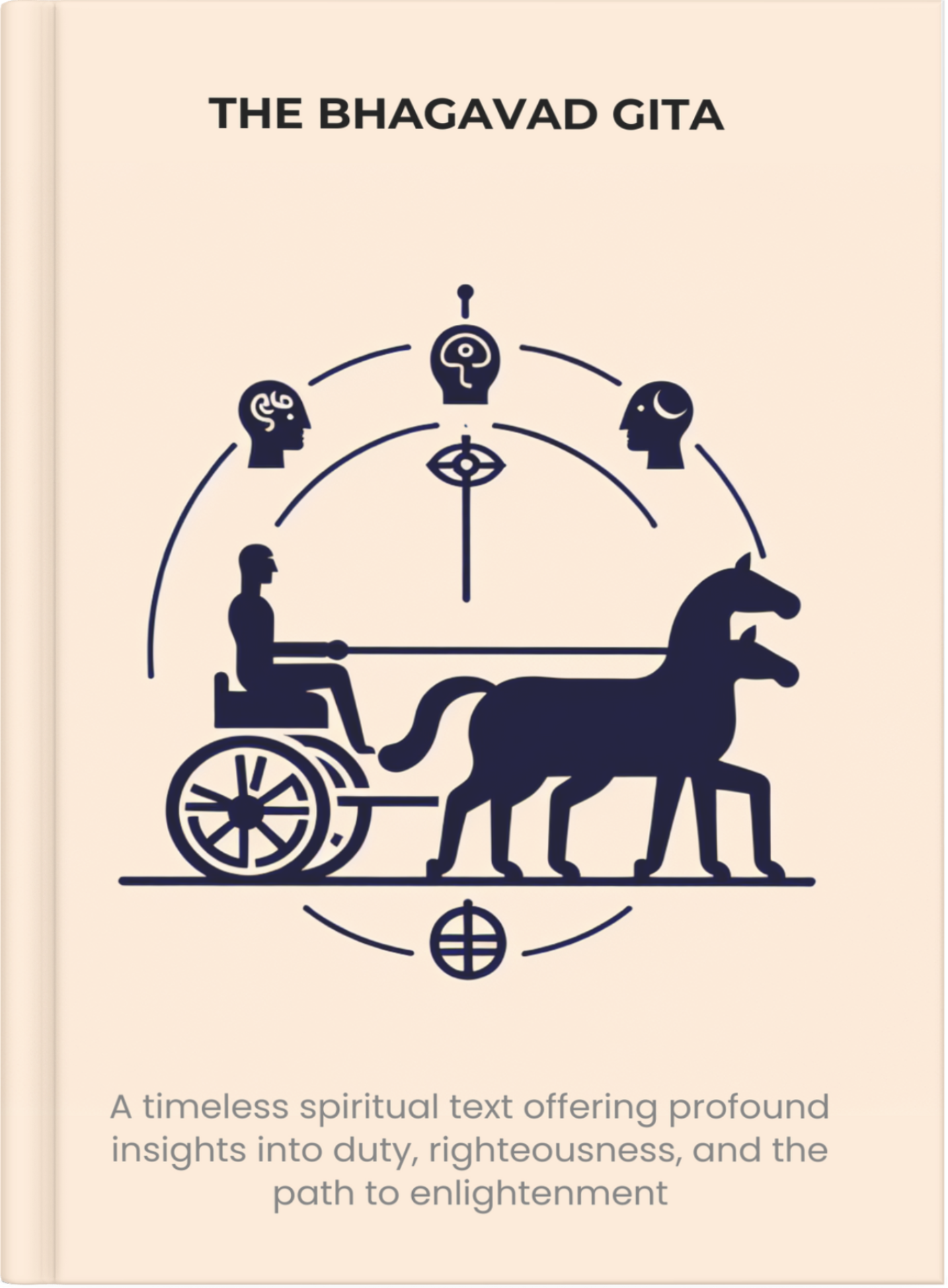
The Bhagavad Gita
Vyasa
The Bhagavad Gita, a 700-verse Hindu scripture that is part of the Indian epic Mahabharata, is a conversation between prince Arjuna and the god Krishna, who serves as his charioteer. This sacred text addresses the moral and philosophical dilemmas faced by Arjuna on the battlefield of Kurukshetra and provides guidance on how to live a righteous life, fulfill one's duties, and attain spiritual wisdom.
0:000:00
Keypoint 1: The Dilemma of Arjuna
The Bhagavad Gita opens with a dramatic and poignant scene on the battlefield of Kurukshetra. Arjuna, a prince and a warrior, stands in his chariot, gazing upon the armies arrayed for battle. As he surveys the scene, he is overcome with a profound sense of despair and moral confusion. The warriors he sees on both sides are his relatives, beloved friends, and revered teachers. The prospect of killing them in battle fills him with horror and sorrow. Arjuna's heart is heavy with the weight of the impending conflict, and he is torn between his duty as a warrior and his love for his family and friends.
In this moment of crisis, Arjuna turns to his charioteer, Krishna, for guidance. He expresses his anguish and reluctance to fight, questioning the righteousness of the war and the value of victory if it comes at the cost of the lives of those he holds dear. Arjuna's dilemma is not just a personal one; it is a universal human conflict between duty and emotion, righteousness and compassion. He is paralyzed by his inner turmoil, unable to reconcile his responsibilities as a warrior with his moral and emotional convictions.
Arjuna's crisis is a pivotal moment in the Bhagavad Gita, setting the stage for the profound teachings that follow. His vulnerability and honesty in expressing his doubts and fears make him a relatable and sympathetic figure. His struggle reflects the broader human experience of facing difficult choices and the search for meaning and purpose in the face of suffering and uncertainty.
Krishna's response to Arjuna's dilemma forms the core of the Bhagavad Gita's teachings. He begins by addressing Arjuna's despondency and urging him to rise above his doubts and fears. Krishna emphasizes the importance of duty (dharma) and the need to act in accordance with one's responsibilities, regardless of the personal cost. He introduces the concept of selfless action, encouraging Arjuna to perform his duties without attachment to the results. This idea of detached action becomes a central theme in the Gita, offering a path to spiritual liberation and inner peace.
Arjuna's dilemma and Krishna's counsel highlight the complex interplay between duty, morality, and spirituality. The Bhagavad Gita uses this narrative to explore profound philosophical questions and provide practical guidance for living a righteous and fulfilling life. Arjuna's journey from confusion to clarity, from despair to determination, serves as an inspiring example of the transformative power of wisdom and the importance of seeking guidance in times of crisis.
In this moment of crisis, Arjuna turns to his charioteer, Krishna, for guidance. He expresses his anguish and reluctance to fight, questioning the righteousness of the war and the value of victory if it comes at the cost of the lives of those he holds dear. Arjuna's dilemma is not just a personal one; it is a universal human conflict between duty and emotion, righteousness and compassion. He is paralyzed by his inner turmoil, unable to reconcile his responsibilities as a warrior with his moral and emotional convictions.
Arjuna's crisis is a pivotal moment in the Bhagavad Gita, setting the stage for the profound teachings that follow. His vulnerability and honesty in expressing his doubts and fears make him a relatable and sympathetic figure. His struggle reflects the broader human experience of facing difficult choices and the search for meaning and purpose in the face of suffering and uncertainty.
Krishna's response to Arjuna's dilemma forms the core of the Bhagavad Gita's teachings. He begins by addressing Arjuna's despondency and urging him to rise above his doubts and fears. Krishna emphasizes the importance of duty (dharma) and the need to act in accordance with one's responsibilities, regardless of the personal cost. He introduces the concept of selfless action, encouraging Arjuna to perform his duties without attachment to the results. This idea of detached action becomes a central theme in the Gita, offering a path to spiritual liberation and inner peace.
Arjuna's dilemma and Krishna's counsel highlight the complex interplay between duty, morality, and spirituality. The Bhagavad Gita uses this narrative to explore profound philosophical questions and provide practical guidance for living a righteous and fulfilling life. Arjuna's journey from confusion to clarity, from despair to determination, serves as an inspiring example of the transformative power of wisdom and the importance of seeking guidance in times of crisis.

